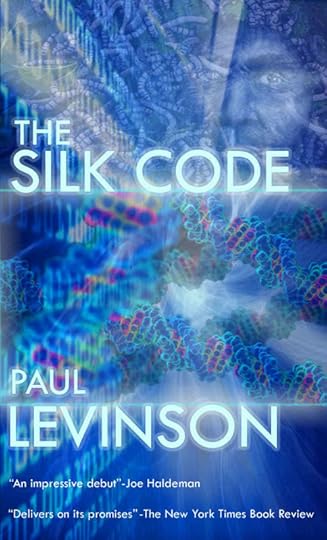Paul Levinson's Blog: Levinson at Large, page 93
August 20, 2021
Films Before Frankenstein, Parts 1 and 2
I was invited by Phil De Parto to give a lecture/lead a discussion for the Science Fiction Association of Bergen County about science fiction and horror movies prior to Frankenstein, in May 2021. That event went so well -- aka left so much more to be covered -- that Phil invited me back in August 2021 to give a Part 2 of that lecture/discussion. Both were via Zoom and were recorded. Here they are -- enjoy!
Paul Levinson's books ... Paul Levinson's music
August 12, 2021
Hit and Run: Lior Raz and Silvercup

I've come to know Lior Raz as one of the creative powerhouses (along with Avi Issacharoff) of three seasons and a fourth forthcoming of Fauda, about the best depiction I've ever seen of the Israeli-Palestinian conflict, viewed through the eyes of an Israeli undercover unit, in which Raz plays Doron, and therein stars in the series as well.
So of course I was going to see Hit and Run, a new series which debuted on Netflix, which also was co-created by Raz and Issacharoff, and also stars Raz. This time he's an Israeli tour-guide, married to American ballet dancer, who is killed in a hit-and-run before the first episode is over. Before the nine episodes of this first season are over, we see Raz's Segev as much in New York as in Tel Aviv, and a narrative seething with action and a cast who promise to become memorable in their first scene and usually do.
My favorites this time, in addition to Segev, are Tali (played by Moran Rosenblatt, also in Fauda), a resourceful, pregnant Israeli police detective who is Segev's staunchest ally in Tel Aviv, and Naomi (played by Sanaa Lathan, not in Fauda, but in The Affair), who's an investigative reporter with New York Magazine, was once in some kind of commando unit with Segev, and is now his staunchest ally in New York.
In addition to the non-stop action and complex fast-twisting plot, there's also more than a fair share of death meted out to all kinds of characters, which I consider a plus in this kind of series, because you begin to realize you never will know who will survive a given episode, because in fact you don't. The scenery was also good. As a life-long New Yorker, I was happy to see Silvercup Bakery -- or what was Silvercup Bakery -- in one of the many chases on the highway scenes. Hey, the bread itself was white bread, probably the worst thing to give a kid, but it sure made a tasty sandwich.
Hit and Run was better than tasty, and I'd be stunned if there wasn't a second season, but I know less about the inner workings of television series than I do about bread, so who knows. But I'll be back here as soon as I finish bingeing it, if there is a second season of Hit and Run, so see you back here.
getting an education about the workings of television from someone who knows
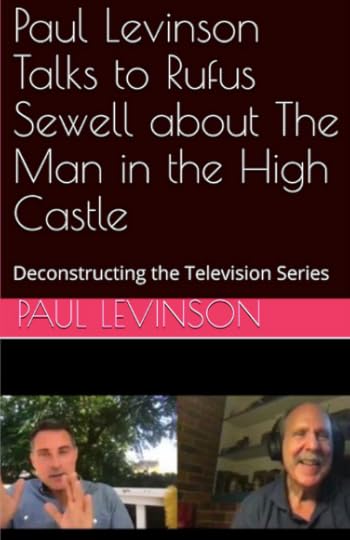 Paul Levinson's books ... Paul Levinson's music
Paul Levinson's books ... Paul Levinson's music
August 9, 2021
Outlier: Nordic Noir, Criminal Minds Style
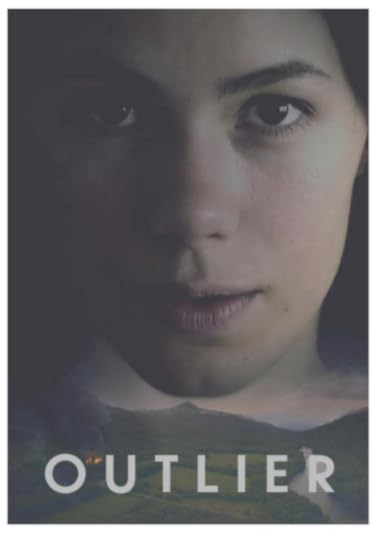
Well, there's no team of FBI profilers working the case in Outlier, in fact no FBI and not much of a team at all, but Maya Angell, a doctoral student in London who goes back to her hometown in northern Norway to investigate the killing of a young woman, would fit right in with the BAU.
She begins her work in Norway by telling the incompetent police chief that the man he has locked up for the crime couldn't be the killer, because he acts on his emotions too quickly. The killer, Maya quickly realizes, is a serial killer, who operates much more carefully.
And then things get really interesting, as Maya realizes that some kind of sexual attack she experienced as a child, but can't quite remember, may in some way be connected to this serial killer. Meanwhile, we get to meet him. He's married, with two kids, a family man who gets his kicks by kidnapping and killing women when he's out on his job, installing video equipment in peoples' homes.
Maya is an intelligent, resilient, though deeply wounded character, and we get to slowly see how she wound up that way as she pursues the case. Good acting in this role by Hanne Mathisen Haga, and the northern scenery is vivid and convincing. The other characters range from interesting to ok. I found her London fiance who doesn't want Maya to pursue this case to be annoying. But Hanne's performance brings this definitely not-ensenble series home to a powerful and somewhat surprising ending.
This was just the first season of Outlier. Will there be a second season? I hope so. But whatever happens, hats off to Arne Berggren, who wrote, directed, and executive produced this off-beat nordic noir series, which makes especially fine viewing on a few hot August evenings.
August 8, 2021
How Can You Mend a Broken Heart: Watch this Documentary, It'll Help.

For as long as I can remember, the Beatles have been my all-time favorite group, with the Rolling Stones and the Beach Boys vying for second place. The Bee Gees were in my top ten, for sure. But several things in the past few weeks have brought them into vying for second place too, in my heart and mind.
How Can You Mend a Broken Heart, a documentary named after one of the Bee Gees' great songs (they have so many), which came out last year but my wife and I just saw last night, was one big reason. It brought home what I already knew, that the Bee Gees, who had such wonderful recordings in the 1960s, like "Massachusetts" (more on that below) and "To Love Somebody" that I loved back then about as much as the Beatles, went on to have an even more successful disco career (with songs that I liked enough, but not as much as their original 60s work), and then went on to record and write all kind of other great songs in the 1980s.
The Beatles and the Beach Boys were effectively finished by the 1970s (on the Beach Boys, without Brian Wilson performing and writing new material, they just were a different group). The Stones continued, but were never quite as good after the departure of Brian Jones. They had some good songs into the early 1980s -- like "Start Me Up" -- but not as huge in their influence on our popular culture as the Bee Gees' disco phase, the epitome of which was probably in the Saturday Night Fever movie. So on the basis of just that level of analysis, I now put the Bee Gees in a tie for second place along with the Stones and the Beach Boys.
The Bee Gees of course are known for their harmony. There are few sounds in this world as appealing and comforting as Beatles' three-way harmony, but the Bee Gees not only came from the same city (so pronounce words the same way) but the same womb. Their extraordinarily beautiful and tight harmony for all the world often sounds like one person singing three parts. Three of the Beach Boys -- Brian, Carl, and Dennis Wilson -- were also brothers. But the fantastical, whispy, soaring arrangements by Brian took the voices in directions other than the vibrating, magical sound of the Bee Gees.
And then there are the individual voices themselves. I would say Robin has the best voice of every one of the members of the Beatles, Beach Boys, Rolling Stones, and Bee Gees. Listen to him sing "Massachusetts," and tell me that voice literally does not only touch but massage your heart.
Which brings me to one other reason (I'm not going to tell you all of them) that I've come to hold the Bee Gees in even higher esteem. Listen to this gem of a cover of "Massachusetts" by the Last Band on Earth, a father and his two young teenage kids (a girl and a boy). Robin's voice and that song are so thoroughly penetrating of the soul, even this cover manages to capture and convey some that.
Back to the documentary, Barry says near the end that he'd rather have his brothers alive and with him, than all the great hits that they made. I really wish Robin and Maurice were still with us, too. But it’s also true that the music they made brings me joy every day.
July 25, 2021
Blood Red Sky: Red-Letter-Day Outstanding

I'm not the biggest fan of vampire movies, but I really liked Abraham Lincoln: Vampire Hunter, and Netflix says Blood Red Sky is currently its most watched new movie, so I gave it shot. And I think it's outstanding, or, more precisely, a powerful, original mix of two venerable genres -- terrorist hijacking of a plane, and vampires -- with pounding action throughout and a great can't-catch-your-breath ending.
I should add that I haven't been in plane since November 2019 due to the pandemic lockdown, and I didn't intend to with the recent surge of the delta variant, and after seeing this movie I don't think I'll go on a plane for a while even if the vaccine I took early in the year were 100% effective and everyone was vaccinated.
So here's the plot in a nutshell, without any big spoilers. A plane is hijacked. Unbeknownst to the hijackers, the young mother on board with her pre-teen son is a vampire (that is, she is and he's not). Most of the movie is a backstory of the plane's harrowing flight -- the movie starts when the plane lands -- and there's a backstory within the backstory in which we find out how the mother became a vampire, when her son was just a little baby.
In addition to the backstory within the backstory, Blood Red Sky has other nice touches. When mom's in full vampire mode, she looks like a character out of the The Cabinet of Dr. Caligari, which makes good pictorial sense, given that Caligari and Blood Red Sky are both German films. And I liked that one of the heroes of the narrative, Farid, is Muslim.
But, listen, this movie is not for the weak of stomach. These vampires are savage. But that savagery is warranted, and makes for several top-notch emotional scenes in which Nadja the mother is torn between vampire lust for blood and motherly love for her son Elias.
July 22, 2021
Gemini Man: A Missed Time-Travel Op
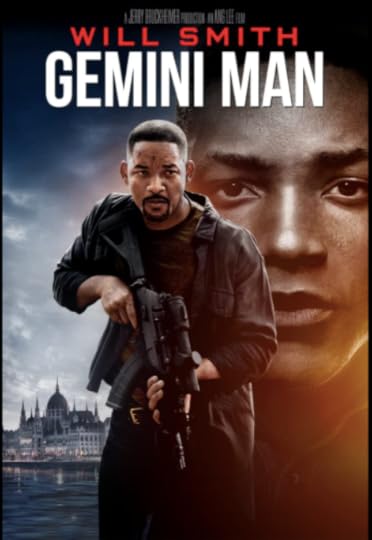
I saw Ang Lee's 2019 Gemini Man on Hulu last night. Mainly because of what it could have been, but wasn't. It had lots of star power with Will Smith and Clive Owen, and lesser-known Mary Elizabeth Winstead was good, too. The action scenes were excellent. As to the plot ...
Well, the story features Smith's Henry Brogan fighting a younger version of himself, sent to do him in by Owen's Clay Veris. Smith not only acted well, but looked his younger self via a de-aging process I last saw in The Irishman, which worked very well. My initial thought and expectation is this could amount to a good time-travel narrative, in which young Brogan has the advantage over his older self, in that the younger version could kill the older version, but not vice versa, since if the younger version were killed that would instantly erase the older version from existence. (Of course, that time travel scenario would have had to account for why the older Brogan didn't remember being attacked by a younger version of himself, but that could have been fun to work out, too.)
Instead, the explanation for the older and younger Brogan is cloning. Now, that has the advantage of certainly being possible in reality, in contrast to time travel, which (a) hasn't happened yet (as far I know), and (b) is likely to never happen, owing to the paradoxes involved (like the grandfather paradox: if you travel back in time and prevent your grandparents from meeting, how did you exist to travel back in the first place) and the "solutions" which are even more incredible than time travel (travel to past generates alternates realities, one in which the time traveler exists and one which the time traveler does not). But, in my view, the cloning explanation for more than one Brogan makes for a more mundane, less intellectually challenging, even boring narrative.
But, hey, if I feel so strongly about that, maybe I should write a story with that time-travel mechanism, and get it to a Hollywood producer, rather than complaining about Lee's movie (for which Game of Thrones' David Benioff wrote the screenplay, with two others, so it's not even mostly Lee's fault). Anyway, see the movie, if you haven't already, and see what you think.

July 19, 2021
McCartney 3, 2, 1: Guide to Eternity
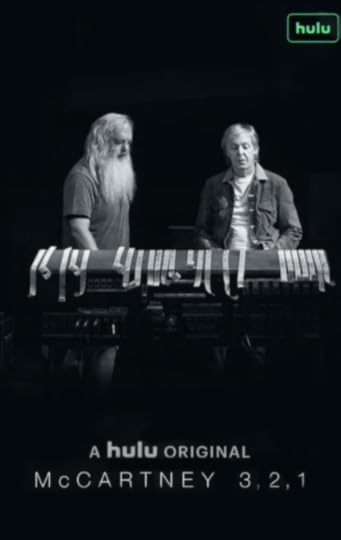
The first thing I want to tell you about McCartney 3, 2, 1 -- Rick Rubin's incandescent black-and-white three-hour six-episode interview with McCartney on Hulu -- is that in addition to being mind blowing and musically joyful, it made me very sad.
Not just because John and George should by all rights still be with us. But because Paul says at some point that since the Beatles are finished, their work now complete, he's become a fan of the Beatles, and much better able to appreciate their music which includes his songs, his voice, his bass, his ideas for arrangements, and much more.
And I don't want the Beatles to be finished. I want them to go on forever making that uniquely wonderful and always evolving music. And though I know that's impossible, I don't care. The pleasure that the Beatles brought to me and so many millions and millions of people was and is magical. Including "Free As A Bird" and "It's Real Love," recorded after Lennon was gone, and which weren't in this documentary and I missed. But if magic is involved, anything is possible, isn't it?
The conversation, though, was one for the ages, and my guess is it will be watched and listened to and carefully analyzed for thousands of years. A lot of it I already knew, like how McCartney arrived at Lennon's house with an essentially complete "Here, There, and Everywhere," which may be McCartney's favorite Beatles song. And a lot of it I didn't, like how Lennon really liked "Here, There, and Everywhere," and how pleased McCartney was when Lennon told him so.
Just hearing the tracks of the songs that Rubin played and played with, as a beckoning of McCartney's rembrenances and explanations, were a pleasure to the ear, and the heart, and soul. As some of you may know, ever since The Village Voice published my "A Vote for McCartney" in 1971 -- my defense of McCartney's solo albums, after he left the Beatles, in the face of the Voice's dyspeptic critic Robert Christgau's attack -- McCartney has been more to me than a member of the Beatles. That after all was my first published article. But seeing McCartney 3, 2, 1 brings home just how much this genius contributed to the Beatles, and how he managed to do that. I used to tell people in the 1970s that I thought the Beatles' music would live as long as Shakespeare's plays. I'd add now that Rubin's movie will be an important accompaniment to what those four did.
Paul Levinson's books ... Paul Levinson's music
July 17, 2021
Summer of Soul: Immensely Enjoyable and Crucially Educational
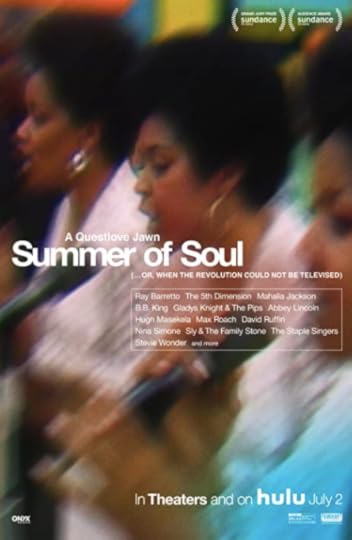
My wife and I just saw Summer of Soul on Hulu. We loved it.
It's a musical documentary, directed by Questlove, about a festival in Harlem in July 1969, in what is now Marcus Garvey Park. Around the same time as Woodstock and human beings first walked on the Moon. The concerts were superbly recorded -- both sight and sound -- at the time. The line-up included included Stevie Wonder, Sly and the Family Stone, Nina Simone, Gladys Knight and the Pips, the Fifth Dimension, the Staples, Mahalia Jackson, the Chambers Brothers, David Ruffin (he had just left the Temptations), and more. The mystery is why hasn't this been seen until now?
The obvious answer is racism, but there has to be more to it than that. I'm wondering why didn't Berry Gordy pick it up, for example? It's true that Woodstock sucked up a lot of the energy, but surely there were a sufficient number of people who would have been thrilled to see this back then, or any time since then, to get this fabulous tableau of a movie into theaters and/or onto old-fashioned television screens, so the world could have seen it long before now.
Anyway, here's some of what I thought was most rewarding in this documentary:
It was great to see Stevie Wonder, the Staples, and the Fifth Dimension sing songs I didn't know.It was great to see some of these groups -- especially Sly and the Family Stone, David Ruffin, and the Fifth Dimension -- sing some of their hit records, aka songs I did know.About the Fifth Dimension, it was also wonderful seeing Marilyn McCue and Bill Davis, Jr. in the present day, or close to it, watching and so deeply moved by their performances back in 1969. Clearly, this was the first time they were seeing this, too.John Lindsay was Mayor back then. He remains, to this day, the only Republican I ever voted for (in 1969, the first time I voted, come to think of it) or liked.Jesse Jackson was inspiring as always to see on stage back then.The commentary, by Charlayne Hunter-Gault, Lin-Manuel Miranda, Darryl Lewis, and many others, was top-notch and clarifying.One point made in the documentary that I don't agree with is the oft-heard lament that the money spent on the Moon landing could have been better spent elsewhere here on Earth. My take on this is that human beings are citizens of the universe, not just this planet, and getting our species out into the solar system and the galaxy and beyond will be a boon for all humanity.But that doesn't stop in the slightest this documentary from being a masterpiece, and the rare combination of something that is immensely enjoyable (the music) and crucially educational on the subject of Black Americans being treated fairly and decently, a goal which we still in this country are clearly a long way from achieving.
July 16, 2021
Podcast: Thinking about Asimov's Foundation on Apple TV+
Welcome to Light On Light Through, Episode 186, in which I consider the history, implications, and possibilities of Isaac Asimov's Foundation series debuting on Apple TV+ this September.
See the trailer. 2009 podcast episode: Asimov's Foundation and Herbert's Dune Trilogies as Sources of Philosophy
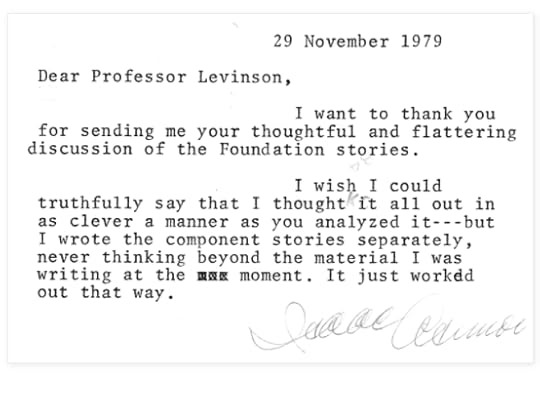
July 11, 2021
Professor T: Sherlock with a Different Name in the 2020s
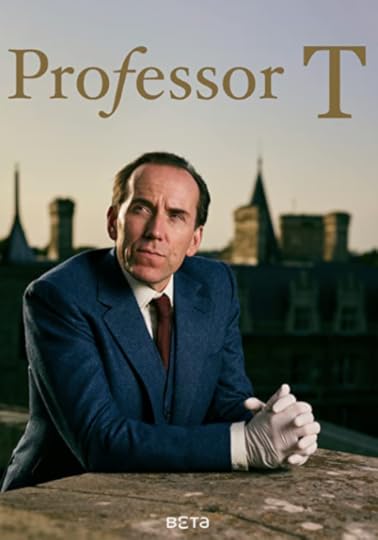
Checking in with a quick review of Professor T, a British version of a Belgian TV series which debuted on PBS tonight. It's quite good. An idiosyncratic professor of criminology at Cambridge who is mildly OCD and very reminiscent of Sherlock Holmes, called in to help the police with a variety of cases.
Of course the professor is reluctant but of course the professor agrees. He's brilliantly perceptive, able to hypnotize a reluctant victim, and bald-facedly lie to a suspect to secure a confession. The Professor is backed up by a suitably modern of cast of police, ranging from those are thrilled to have him work with them to those who are threatened.
The Cambridge location is anything but modern, though, and that's a big part of the series' charm. If you subtract the current cars and other 21st century, you could indeed be watching a story taking place in the 1890s or 1920s or 40s. That's because, in addition to Cambridge, Professor T moves and talks in an ageless way. Good job by Ben Miller (Bridgerton) playing the professor.
The series consists of new cases in every episode -- rather than an investigation that continues across episodes -- and while I usually prefer the continuing format, the standalone episode format is part of the old fashioned charm of this series, too. It's on a little too late for me to brew a pot of tea and sip it as I watch the show -- with mik, thank you -- but I'll think of Professor T when I have cups in the morning and during the day, will look forward to watching it on Sunday evening, and will do my best to report back to you about it later that night or straightaway on the next day.
Paul Levinson's books ... Paul Levinson's musicLevinson at Large
- Paul Levinson's profile
- 341 followers


